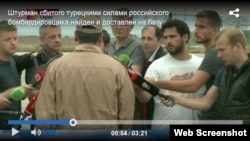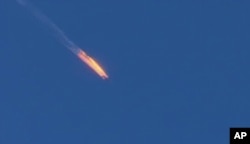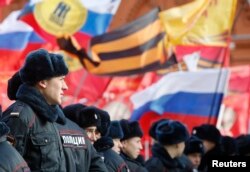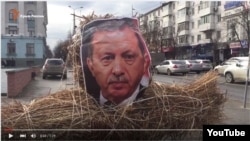It certainly made for riveting television. That much was clear.
Captain Konstantin Murakhtin, the surviving airman of the Russian fighter jet downed by two Turkish F-16s on the Syrian/Turkish border Tuesday, appeared before Russian TV journalists to answer questions just days after the incident.
How was he feeling? Good. "Russian doctors work miracles," Murakhtin said in a low baritone.
How well did he and his co-pilot know the terrain? "Like the back of my hand," answered Murakhtin, adding that the Russian plane had never entered Turkish airspace "for a single second."
Had Turkish jets issued warnings before firing? Not a single one. "The rocket hit us right in the tail," he said.
What would he do next? Murakhtin insisted he wanted to go back to the action. "Someone has to pay" for the death of my co-pilot, he said.
Murakhtin's comments left little doubt that he supported Russian President Vladimir Putin's version of events: Russia had been taking on the Islamic State from the skies of Syria when, in Putin's words, it was unexpectedly "stabbed in the back" by Turkey.
Answers spark more questions
But questions abound. Aside from the fact that there were no known IS targets in the area, the TV interview, filmed from Murakhtin's back and never showing the airman's face, seemed suspiciously choreographed.
In addition, the press scrum was noticeably lithe given the magnitude of the scoop. The audio levels jumped strangely between questions and answers, suggesting hurried edits or multiple takes. Even Murakhtin's answers seemed strangely canned, with the airman appearing to dip his head several times, possibly to check his notes.
And if Murakhtin sounded at times as though he had been cast in a low-budget Hollywood action movie? That is as it should be, said Feodor Krasheninnikov, an analyst based in Ekaterinburg.
"It's clear that Hollywood aesthetics have influenced our propagandists," Krasheninnikov said. "They take Hollywood tropes and imitate American films."
"Often," he added, "not the best ones."
While the Soviet Union's propaganda machine was renowned for dull infospeak, modern-day Russia has embraced cable news-style "infotainment."
Krasheninnikov traces the Kremlin's preferred method of spin to “Wag the Dog,” a 1997 black comedy film in which a Washington spin doctor distracts the public from a sex scandal in the White House by hiring a Hollywood producer to "fake a war" with Albania.
"A whole generation grew up on that film, only they never saw it as a comedy," Krasheninnikov said.
Wagging the dog
Take the Maidan popular uprising in Ukraine, where Kremlin-supported media relentlessly reported the events that ousted then-President Viktor Yanukovych as a takeover by a "fascist junta."
"Nazis" now ruled the streets of Kyiv, Russian media reported at the time. Never mind that the same ethnic Russian "extras" surfaced as victims of Ukrainian nationalist abuse in multiple towns on multiple occasions.
At one point, Russia's Channel 1 even ran an interview with a woman who claimed Ukrainian officials had murdered her 3-year-old son — crucifying him in the town's center square. Ukrainian soldiers, she claimed, then tied her to a tank and dragged her through the streets. A subsequent investigation by independent journalists found no one in the town recalled the event ever happening.
These stories "wagged the dog" on television, but the anger they provoked was real. The fighting between pro-Russian rebels and the Ukrainian army has left over 6,000 dead.
How media coverage of the death of the Russian pilot will affect the situation remains to be seen.
#StabInTheBack
The Russian hashtag #StabInTheBack has been trending on social media ever since the downing of the plane. Russian bloggers have also swamped the Internet with memes comparing Turkish President Recep Tayyip Erdogan with Germany's Adolf Hitler.
Friday, activists in Simferopol, a city annexed along with the Crimean Peninsula, burned an effigy of Erdogan.
Pro-Kremlin activists have also defaced the Turkish consulate in Moscow.
And for Americans celebrating the Thanksgiving holiday weekend, Russian bloggers had a timely joke involving Presidents Barack Obama and Putin.
"What will you have for dinner tonight?" asks Obama.
"Turkey," answers the Russian leader.
For now, the Kremlin seems intent on managing public anger. Moscow has ruled out a military conflict with Turkey, opting instead for economic sanctions and visa restrictions against Ankara.
And while it may be some time before the world knows what really happened over the skies of the Syrian-Turkish border this week, the risk of Russians' fury boiling over is real.
Because sometimes when you wag the dog, the dog ends up wagging you.







